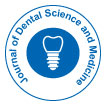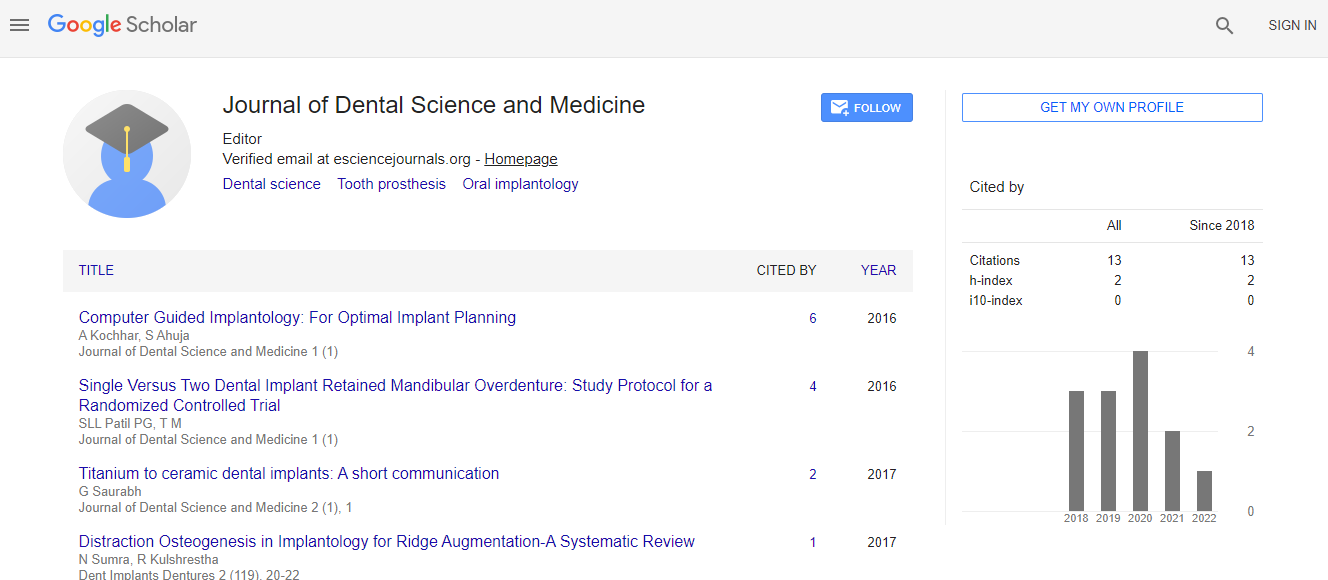Our Group organises 3000+ Global Conferenceseries Events every year across USA, Europe & Asia with support from 1000 more scientific Societies and Publishes 700+ Open Access Journals which contains over 50000 eminent personalities, reputed scientists as editorial board members.
Open Access Journals gaining more Readers and Citations
700 Journals and 15,000,000 Readers Each Journal is getting 25,000+ Readers
Google Scholar citation report
Citations : 13
Journal of Dental Science and Medicine received 13 citations as per Google Scholar report
Indexed In
- RefSeek
- Hamdard University
- EBSCO A-Z
- ICMJE
Useful Links
Recommended Journals
Related Subjects
Share This Page
The mechanism of pomegranate extract (Pumica granatum L) in killing oral cavity cancer cells through VEGF expression and apoptosis
7th International Conference on Prosthodontics & Orthodontics
Sri Hernawati
Faculty of Dentistry university of Jember, Indonesia
ScientificTracks Abstracts: Dental Science and Medicine
Abstract
Cancer is one of the leading causes of death throughout the world. In 2013, it was the number seven cause of death In Indonesia, by reaching 1.4% or an estimated 347,792 people. Among them, squamous cell carcinoma is the most common cancer in the oral cavity, patient survival is less than 50 %. Despite rapid advances in the field of surgical therapy, radiation, and chemotherapy, the treatment of cancer has not been completed. Meanwhile, new cases continue to emerge every year. The development and growth of cancer cells is caused by several factors, including; Apoptotic barriers and angiogenesis activity. The formation of angiogenesis is induced by growth factors, one of which is dominated by VEGF. With these backgrounds, authors want to inhibit cancer cell growth by increasing apoptosis of cancer cells and inhibiting the formation of angiogenesis. Pomegranate (punica granatum L, PGL) is one of the plants that has an active ingredient of ellagic acid (EA), EA in some studies has anti-cancer activity in vitro, but EA is difficult to absorb. Biovability of pomegranate / PGL fruit extract is better than EA because it is easily absorbed and contains polyphenol. The aim of this study was to determine the mechanism of action of whole pomegranate extract (PGL) in killing oral cavity cancer cells through VEGF expression and apoptosis. The research method used was experimental laboratories, 24 mice (Balb / c), males, aged 5 months were divided randomly into 3 groups: K0 (not suffering from cancer and not given PGL), K1 (had cancer and was not given PGL, P1 (have cancer and is given PGL). Mice become cancerous by: injecting the buccal mucosa of the right mouse with benzopirene 0.04 mg dissolved in 0.04ml olivarum oil, 3 times a week for 4 weeks. Giving PGL at a dose of 75 mg / kg BW / day for 4 weeks. Examination using immunohistochemistry and tunnel assay techniques. The results showed that administration of pomegranate whole extract (PGL) group P1 could kill cancer cells by decreasing VEGF expression 0.183 ���± 0.098 compared to KO group 0.133 ���± 0.103 did not differ significantly, differ significantly in comparison with K1 group 0.350 ���± 0.104. Whole pomegranate extract (P1) killed cancer cells by increasing apoptosis expression highest 0.367 ���± 0.196 compared to the KO group 0.083 ���± 0.132 and K1 0.050 ���± 0.054 significantly different than KO and K1. In conclusion, the mechanism of action of pomegranate extract (PGL) / P1 in killing cancer cethlls is by increasing apoptosis expression and decreasing VEGF expression.Biography
Sri Hernawati has completed her PhD at the age of .... years from Airlangga University. She is the xice dean of Faculty of Dentistry University of Jember, Indonesia. She has published more than 10 papers in reputed journals.

 Spanish
Spanish  Chinese
Chinese  Russian
Russian  German
German  French
French  Japanese
Japanese  Portuguese
Portuguese  Hindi
Hindi 